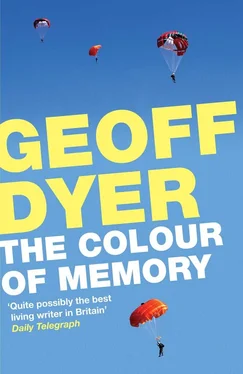‘Brilliant! Brilliant!’ he shouted. ‘Have you got a magnet?’
‘’Fraid not. Hard luck.’
‘Maybe we can buy one.’
‘Where?’
‘Mr Patel’s is the best bet but he shuts at six.’
‘What time is it now?’
We stood and counted quietly as the town-hall clock struck four. . five. . six.
Steranko hurtled towards the door. We heard a crash as he tumbled down a few steps and then looked down into the street and saw him sprinting along the pavement.
‘Poor Steranko. I’d laugh if the shop was shut,’ Foomie said and we both giggled. I went down to my flat and hunted out a ball of string.
Anxious minutes passed. The sky was still beautiful. Steranko’s easel cast awkward shadows across the roof. Birds chirped and sang.
Steranko came back through the door, grim-faced and breathing heavily. Then he grinned hugely and pulled a magnet out of his pocket. It was shaped exactly like a magnet in a children’s comic: U-shaped, painted red except for a quarter of an inch at each end.
‘Foomie, if this works I’ll buy you the biggest meal you’ve ever eaten,’ Steranko said, tying the string around the magnet in a fierce knot. ‘And if it doesn’t you’ll be on bread and water for six months. . Right, now comes the difficult part.’
The three of us crouched round the drainage hole. It was like a scene from Mark Twain rewritten for the late urban world when all that remained of lakes and rivers was this one tiny plunge hole leading to a pit of sewage. Steranko paid out the string. When he had let out about fifty feet there was a faint plop. He continued letting out the string. Every now and again he tugged it to check that it was still taut. He paid out several feet more until the string hung loose in his fist.
‘Bring ’er up,’ I said.
Steranko gently pulled at the string, careful to ensure that the magnet didn’t bang against the sides of the pipe. He kept pulling. The string was tense. Eventually it became wet and dirty. Foomie and I looked on expectantly as Steranko stood up and pulled the magnet clear of the hole. And there, clinging precariously to it, was a small bunch of keys.
‘Rejoice! Rejoice!’ Steranko exclaimed, hugging Foomie and kissing her loudly. ‘The ingenuity of the human mind!’
‘You couldn’t have done it without my string,’ I whined and we all laughed.
‘Superb string,’ Steranko said, beaming and putting his arm around my shoulder.
The sound of the evening rush-hour rose up from the streets. From overhead came the deep clatter and thump of a police helicopter tracking the convoy of prisoners on its way back from the courts to Brixton prison. The three of us stood with our arms around each other, laughing loudly at the sun.
I turned on the TV to watch Wimbledon for a few minutes and ended up watching for two days. Since I’d last watched tennis a couple of years previously the players seemed to have attained new, almost superhuman standards. Not that this made it more interesting — on the contrary it was the sheer tedium of the game that made it so compelling. If you tuned in for five minutes you wouldn’t see much at all, especially in the men’s game where a thunder-flash serve had become so essential that the players had to put themselves in a state of deep trance before they could even think about hitting the ball. One guy took ten bounces of the ball, two finger sniffs, a couple of forehead wipes and a dozen racket twists before smacking the ball into the net. After pausing for two minutes he repeated exactly the same ritual and sent the ball flying into his opponent’s service court. Unfortunately the ball was judged to have touched the net en route and so, to complete what was perhaps the most elaborately time-consuming double-fault ever attempted, he went through the whole routine again before thumping the ball down the opposite tramline. No wonder he was angry.
No wonder, either, that some of the line judges found it difficult to stay awake and had to take pot luck on close calls. It actually seemed that the conflict between players and officials had reached such a pitch of animosity as to constitute the chief interest of the match. As far as the line judges were concerned their job was to goad a given player with unjust decisions until he was forced to concede sufficient penalty points for bad behaviour to leave the match hopelessly beyond reach. Once that had been achieved the officials switched their attention to the other player. As for the players, their behaviour had degenerated to the point where the commentator found himself looking back fondly on John McEnroe as quite a gent. Even unseeded players were now quite capable of the kind of sustained F -ing and Are-you-fucking-blind- ing that used to be the preserve of only the most talented players. I imagined some young player plumbing new depths of unpopularity by threatening the umpire with his racket or taking a swipe at a docile ballboy who’d had the misfortune to hand him an unlucky ball. The stage-managed nastiness of one or two players was almost as ritualised as wrestling. I half expected to see someone whipping up the crowd with a chant of Ea-sy! Ea-sy! after a particularly vicious forearm smash.
Inspired by all this tennis I called Steranko to see if he fancied a game but he was out. So was Carlton. As a last resort I tried Freddie.
‘There’s no point. I can hardly even hit the ball. The only bit of the game I’m any good at is the drinking afterwards — as long as the barman keeps serving I can keep knocking them back,’ he said, laughing enthusiastically at his own joke. ‘Let’s just go out for a drink instead. We can take our rackets if that makes you feel better.’
It was another perfect blue day but I didn’t have a chance to get on the roof until the early evening. The sky was turning lemon where the sun would later set. Overhead it was pale blue with a few air-brush splashes of light cloud. I was sitting at the end of the low wall at the edge of the roof, one arm hanging over the railing, dangling into the blue air like it was a lake. I’d adopted this posture of exaggerated relaxation because of the book I had propped open on my knees: Italo Calvino’s Invisible Cities. Freddie had lent it to me on the strict understanding that I didn’t squander it by reading it on the tube, that I read it only in ideal conditions, when I could savour each sentence ‘like a hammock slung between full stops’. (Freddie tended to wax lyrical about Calvino; he once said that he knew exactly how he was going to meet the woman of his dreams — they’d be sitting opposite each other on the tube, both reading If on a Winter’s Night a Traveller and that would be that.) Sticking more or less to Freddie’s strictures I’d been reading it off and on for about six months and was still only halfway through.
Perched up there on the low wall, I’d only read a couple of pages when I caught a glimpse of someone moving on the opposite block, a blur in the corner of my eye. I looked over and saw a woman leaning on the rail, looking across my roof at the pale yellow of the evening light. I knew I’d seen her somewhere before but had no idea who she was. She was wearing dark glasses and a T-shirt that had been washed so many times it was hardly red at all. Her skin looked tanned and calm in the evening light. Her brown hair was tied back loosely. She glanced towards me as I looked at her.
I shouted ‘Hi’ and smiled. She waved, smiling.
‘Nice isn’t it?’
‘Wonderful. .’
‘I’m surprised there’s not more people up here,’ I said.
‘What?’
All around us was the faint rumble of the evening traffic. We threw words across the street and sometimes they were difficult to catch and fell unheard into the space between us.
Читать дальше












